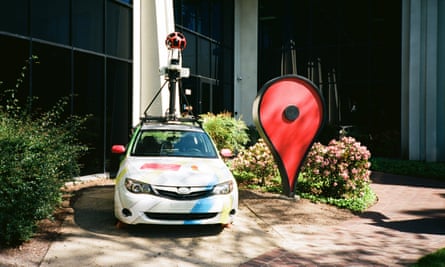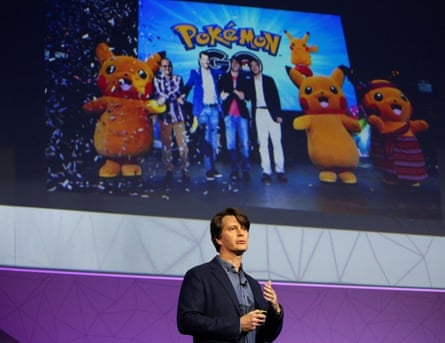It’s not often you meet someone who’s genuinely changed the world, but that’s what happens the day I greet Niantic CEO John Hanke. Sipping his coffee alone in a gargantuan San Franciscan boardroom, I wonder whether the man on the other end of this Zoom call realises just how often people use his former company’s creation, Google Maps.
Hanke’s yearning to create started young. Fresh out of business school in the 1990s and already with one of the first online gaming successes to his name, he was snapped up – along with his company, Keyhole, by Google founders Larry Page and Sergey Brin, and folded into the team that made Google Maps, now arguably the most useful thing on your smartphone.
“None of us were interested in doing the thing where you got your driving directions, printed them out and took it with you on a sheet of paper,” Hanke says. He, Page and Brin wanted to make “the ultimate map … Larry and Sergey were very much believers that geography is a way of organising information.”
Hanke, though, saw virtual maps not just as cold information – but as portals to play. “Think about the games that you play: how many of them start by unfolding a game board – some kind of map?” he asks. “The two just go together.” It’s this marriage of maps and make-believe that’s gone on to define the 55-year-old’s career. He is now perhaps best known as one of the brains behind the $6bn-grossing smartphone game Pokémon Go, and has been involved with everything from putting Pikachu and pals into your real-world neighbourhood to creating accurately mapped military flight training software.

Growing up reading National Geographic, Hanke became fascinated with the idea of mapping our planet, as well as the mind-boggling possibilities of computing: “I was born in the home computer era. Building and making stuff was something that bit me young.” In between attending business lectures at Berkeley, he began charting a more fantastical landscape than Earth: the magic-filled world of Meridian 59, his first video game project. As part of a studio called Archetype Interactive, Hanke and his friends created one of the first massively multiplayer online games to market – a genre later famously popularised by Blizzard’s World of Warcraft. Impressed, Game publisher 3DO bought the rights to the MMO the day Hanke graduated.
Creating Meridian 59 would be a life-defining achievement for most, but Hanke’s tech journey was just getting started. After Berkeley, he co-founded Keyhole, an organisation set up to make truly accurate flight simulators for the military, which secured funding from Sony, NVIDIA and the CIA.
“There was a need to make flight simulation that would accurately simulate the real world, so pilots can train and the visual cues that they [see will] be similar to what they would see in real life,” explains Hanke. Thanks to his experience cramming vast fictional worlds on to compact discs, Keyhole figured out how to compress and easily transmit vast swathes of 3D digital imagery, using its custom tech to build a huge amount of cartographic data and send it across the internet at rapid speed.

Google quickly saw Keyhole’s potential. “Google was very generous with their funding,” says Hanke. “They built our own fleet of aircraft to fly and capture our overhead imagery, then the Street View programme, of course, that led us ultimately to collect our own map data. It was a lot of fun. Making a digital globe that felt like a video game – but that let you explore the world through maps – was a neat way to combine all the things I was interested in.”
As fun as working on Maps was, over his decade at Google, Hanke’s passion for game development never really left him. “Various famous game developers” – he won’t say who – “came to us and said, “I’ve been making this open world type of game, I’d like to make it really open world.” Though the conversations piqued his interest, “we could never quite figure out the right way to work with those companies from inside of Google”.
Longing to return to play, Hanke branched off a new software company, Niantic, to realise his dream of turning Earth into the ultimate game map. “When we started Niantic, we had the idea of people exploring the world – exercising and engaging with other people. We thought that if our games do that, then people will be better off than they were before.”
Niantic’s first step toward this goal was an educational app, Field Trip, which saw players walking around their cities and learning about various landmarks. “That then morphed into our first game, Ingress,” Hanke explains, “We wanted a game where you are seeing the world as you see it, but your mind would be able to add that extra layer of mystery. if I hold up my phone – my scanner, in the parlance of Ingress – it’s telling me about this hidden world.”
Ingress’s spy story about hidden portals in real-world cities was a cult hit, and led directly to Pokémon Go. “The whole fantasy of Pokémon blends perfectly with the real world, right? You’re a Pokémon trainer, out in the world, finding Pokémon. It was just the perfect template for an AR game.” He flew to Tokyo to pitch it to Tsunekazu Ishihara, chief executive of the Pokémon Company. “By the time we got to him, I think level eight was the highest you could reach on Ingress – and he and his wife had both maxed it out. We didn’t really even have to pitch it, he was like, ‘I get it – I love this idea!’”
Thanks to Ingress’s cult success, its dedicated players had already mapped most of the corners of the globe into a gameworld, neatly laying the cartography groundwork for Pikachu and pals. “When we launched Pokémon Go, it was already ready to go on day one worldwide, which blew people’s minds. People didn’t understand how all the places were already mapped. In Kenya they were catching Pokémon everywhere. It was also happening in Taiwan at the same time, in Poland, in Cape Town – and it was because Ingress players had already gone out over the prior four years and done all that.”
Both companies had high hopes for Pokémon Go, but neither were prepared for what was about to unfold. “The amount of money that we forecast the game would make in the first year, we made within the first week of launch,” Hanke recalls, shaking his head in disbelief. “The late-night comedians, politicians, morning-show hosts were all mentioning it. It was great to be part of the cultural conversation.”
after newsletter promotion
But just as there are ethical implications in surveilling the world to amass map data, Niantic had to think hard about its responsibilities if it were to be sending loads of kids on an unsupervised treasure hunt via a device that monitors their location. “Companies have to have a position on how their technology is going to be used,” John says. “I think it’s a trap to say, ‘we’re agnostic, we’re putting the technology out there, somebody might do something bad with it, other people might do something good with it.’ No, I don’t believe that. It is incumbent upon the creators to have a thesis about how it’s going to get used, how it’s going to make the world a better place and why it deserves to exist … It’s really, I think, the responsibility of the CEOs and the board to kind of take control of what’s happening with their technology and be intentional about it.”

How does Hanke weigh up these ethical responsibilities as a tech company? “We’ve worked hard to build the trust of our playing community – and protecting their privacy is an important part of that,” he says. “We only retain location information for the time necessary to operate the game and plan for in-game resources they interact with. After that, we will either remove it from our systems or anonymise it so that it cannot be associated with individual players. We also don’t sell any user information to third parties.”
Despite the fact that it’s been downloaded over 600m times – and over 71 million players were still active in 2021 – many now see Pokémon Go as a “has-been” app. Niantic, however, is still heavily invested. “It was driven by a shared vision for making the Pokémon fantasy real. We still haven’t fully realised that,” Hanke says. “I think that’s what keeps us all going. The technology that we have today doesn’t allow us to completely fulfil the vision that people have in their heads – we’re tortured by that. Our goal is to make it something like Monopoly, something that’s around forever. It’s a sort of Ship of Theseus kind of thing – we’re replacing bits and pieces of it. It’s not the same game it was five years ago, and five years from now it’ll have evolved even further.”
Advances in AI are the key to Pokémon Go’s evolution – and Niantic’s future games, such as its AR pet game Peridot, which is launching on 9 May. Players are given a bespoke pet they’re able to hatch, before embarking on quests together; each Peridot will adapt to the real-world environments around them, adapting to different spaces and obstacles. “AI can react to objects in the real world – people, a park bench, a tree, a grassy lawn – and respond differently based on what’s out there … Peridot has a feel of magic about it. It’s an indie AR pet simulation game, inspired by the original Tamagotchi. The advances in [AR] technology mean that these creatures really understand the world around them.”

Hanke hopes that the next generation of AI tech will vastly improve other games, too, in the not too distant future. “Think about an RPG built 10 years ago, 30 years ago. You walk into the town and you talk to the innkeeper – he could greet you and send you on a quest, but wasn’t much of a conversationalist. The fantasy was to have a rich world where you can interact with characters that felt real and had depth to them, who engage you intellectually in the fantasy of this world. I think we’re about ready to have that. These sort of sentient-feeling entities are going to be totally transformative.”
Hanke is, however, not blind to the potential downsides of recent advances in artificial intelligence. Worries about the jobs that could be replaced by language-literate AI have coalesced around ChatGPT and Google Bard in the past few months, even as we’ve also seen plenty of examples of their limitations. Hanke admits the tech is “fraught with challenges. We have a lot of people that need to be employed to lead happy, productive lives. And if they’re not trained to do the new jobs that are being created – but are instead trained to do the jobs that have been destroyed – then that creates huge societal issues. We’ve got to approach that at a societal, governmental level, and understand that any hugely transformative technology, from electricity to the car, has big effects. It’s not something that the private sector can solve on its own – it’s something that we need to approach collectively as a society.”
Since its heyday in the 90s and 00s, when most of us believed that big tech was ultimately making the world a better place – thus justifying, for many, the legislative and monetary special treatment that companies such as Apple and Google received – the tech industry has become entitled and increasingly dystopian. Since the early days of Google Maps, and the transformative effects of smartphones and early social media, you could argue that it has produced little that has actually improved the lives of everyday people. Hanke’s calls for regulation and government intervention and collaboration are welcome – he is aware, perhaps, that video games too will face such scrutiny in our future, as they cement their place in our social and cultural lives.






